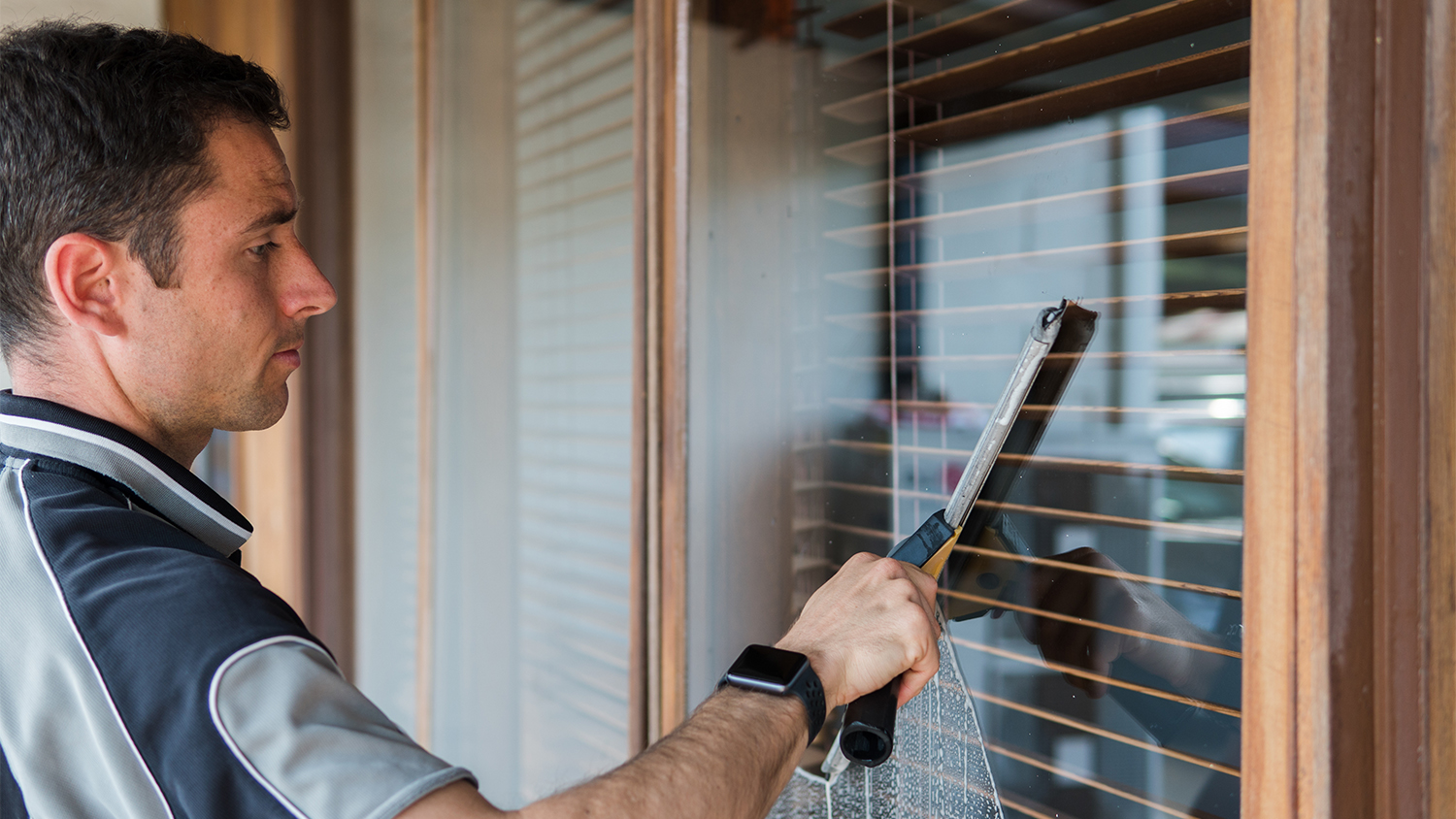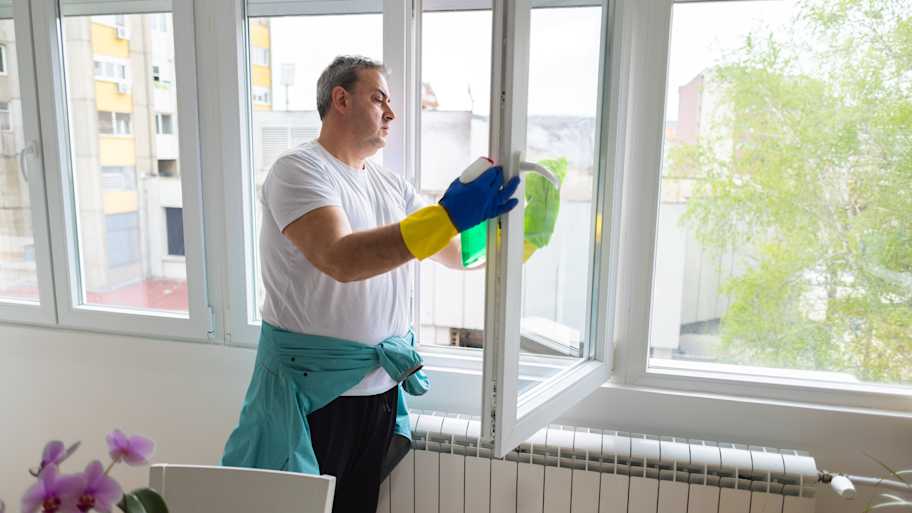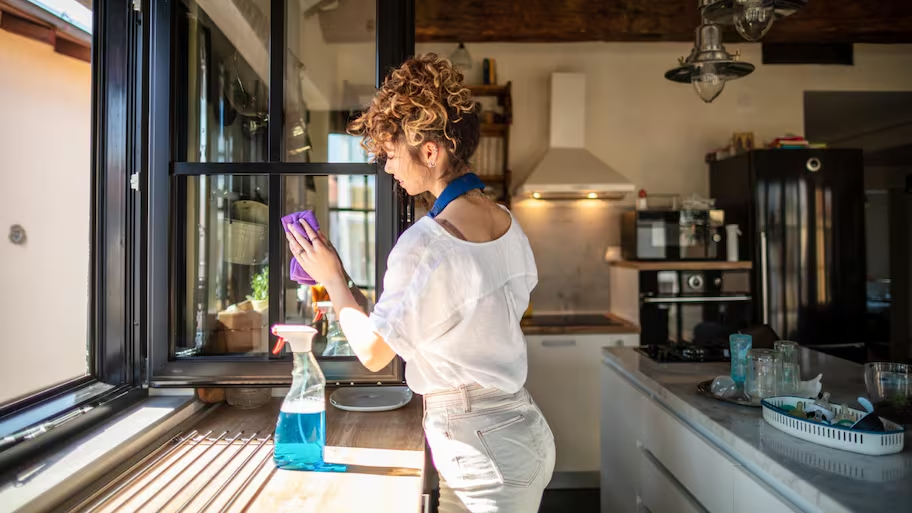
Discover the average window cleaning cost, key price factors, and tips to save money. Get transparent estimates to keep your windows sparkling and your budget on track.
Make the same DIY window cleaner that professionals commonly use


Cleaning the windows in your home is a relatively straightforward process, but if you don’t have the right cleaning solution and tools, you could leave behind unsightly streaks or residue and not get the crystal-clear look you’re going for. While commercial window cleaners are a great option, it’s much more affordable to make the cleaning solution yourself. In this guide, we’ll explain a few different ways that you can make homemade window cleaner using household items you likely already have lying around.
Commercial window cleaners certainly get the job done, but there are two potential downsides to consider.
First, they’re almost always more expensive than making your own window cleaning solution. The recipes we’ll include below will cost you pennies for a gallon or so of window cleaner, whereas commercial products, while effective, usually cost between $5 and $15 for a single spray bottle.
Second, some homeowners worry about window cleaners containing chemicals, which, if not removed properly from the windows, could potentially be harmful to children or pets. These can include the following:
Phthalates
Ammonia
Dyes
Alcohols
If you don’t want to have to worry about reading through ingredient lists on commercial cleaning products, a homemade window cleaner is a simple solution.
Before we start discussing what should go into a homemade window cleaning solution, it’s important that you know what shouldn’t go into them. There are certain chemical combinations and additives that could put you in danger or increase the likelihood of streaks on your windows.
Never mix bleach and vinegar. According to the Washington State Department of Health (DoH), mixing these two chemicals creates toxic chlorine gas.
Never mix bleach and vinegar. The DoH also notes that mixing bleach and acids like vinegar can create poisonous chlorine gas.
Never mix bleach and ammonia. Bleach and ammonia react with each other and create chloramine gasses, which are hazardous to breathe in or if they come in contact with eyes or skin.
Never mix bleach and rubbing alcohol. The Georgia Department of Health (DPH) notes that mixing these two creates chloroform. According to the Centers for Disease Control and Prevention (CDC), chloroform can damage your skin, eyes, and even internal organs.
Try to avoid using tap water. Tap water might be suitable for making a homemade window cleaner, but if you live in an area with hard water, the calcium, magnesium, and other minerals can leave streaks on your freshly cleaned windows.
Avoid adding too much soap. Liquid dish soap is an excellent tool for making a DIY window cleaner, but adding too much could mean it leaves a residue on your windows. If it dries, it could leave streaks or make your windows look cloudy.

Now that you know what not to put in your homemade window cleaner, you can get to work actually making it. Some common additives for DIY window cleaning solutions include liquid dish soap, white distilled vinegar, baking soda, and rubbing alcohol.
Liquid dish soap and warm water are what most professional window cleaners use in their solutions, so it’s about the best option for your cleaner.
Fill a one-gallon bucket or storage container with warm water.
Add five to ten drops of liquid dish soap.
Lightly mix the solution by stirring the bucket or closing and inverting your storage container.
Apply using a soft sponge and wipe clean with a squeegee.
White distilled vinegar is a common household cleaning product, and it’s a great option for cleaning mineral deposits on your windows if you previously cleaned them with hard water.
Add one gallon of warm water to a bucket or storage container.
Add one cup of distilled white vinegar.
Add a few drops of liquid dish soap if your windows are heavily soiled or smudged.
Mix thoroughly.
Apply using a spray bottle or a sponge before wiping dry with a squeegee or microfiber cloth.
Baking soda adds a bit of texture to your homemade window cleaner, so it can be extra helpful for scrubbing dirt, pollen, bird poop, and other debris off of the outside of your windows.
Fill a one-gallon bucket or storage container with warm water.
Add one cup of baking soda to the water.
Add a few drops of liquid dish soap for a deeper clean.
Mix the solution completely before use.
Apply using a sponge or a scrubby pad.
Dry the window after cleaning using a squeegee or microfiber cloth.
Isopropyl alcohol (rubbing alcohol) evaporates more quickly than water, so mixing them together creates a fast-evaporating window cleaner that should leave your glass streak-free.
Fill a one-gallon bucket or container with warm water.
Add one cup of isopropyl alcohol.
Consider adding one-half cup of vinegar or dish soap if you’re dealing with hard water stains or excessively dirty windows.
Mix the solution completely.
Apply with a spray bottle before wiping dry with a microfiber cloth. You can also let the solution air dry if you don’t add dish soap, as the alcohol will prevent streaking.
Homemade window cleaners can be effective for getting a crisp, clear window that looks professionally cleaned, but the cleaning and drying technique is just as important as the cleaning solution you use. Take advantage of the window cleaning tips below to ensure you get a streak-free clean every time.
Use the right cleaner. The homemade cleaning solutions we described above all have slightly different purposes. Make sure you use the right cleaner for your particular window cleaning job for the best results.
Do one window at a time. It might be tempting to soak all of your windows first and then scrub them and dry them, but try to avoid this. Any solution that dries on your windows is likely to leave streaks, so go one by one and be diligent about drying.
Work on a cool, cloudy day. Warmth and direct sunlight will dry both commercial and homemade window cleaners too quickly to get a streak-free shine. Aim for temperatures under 75 degrees (F) and cloudy weather.
Have the right tools. Without a squeegee and a microfiber cloth, you’re almost guaranteed to have some streaking from incomplete drying. Invest a few dollars in these window cleaning tools that professionals use for the best DIY results.
Consider using old newspaper. Don’t have a squeegee or microfiber cloth to dry your windows? Use pages from a black-and-white newspaper. The paper will absorb any remaining moisture, oils, and cleaning solution from the glass.
Based on the responses of 10,000 Angi customers, most homeowners requesting window cleaning prefer both the inside and outside cleaned, accounting for 65.2% of requests. Cleaning the outside only is requested by 28.7%, while cleaning the inside only is less common at 4.3%. Using the right homemade window cleaner can sometimes be beneficial, as it allows homeowners to safely tackle streaks and dirt on both interior and exterior surfaces without harsh chemicals.
Cleaning your windows is one of those cleaning tasks that’s easy and straightforward if you have the right tools and cleaning solutions, so just about any DIYer should be able to tackle it. Window cleaning costs around $220 per home, on average, so you could stand to save a few hundred dollars if you don’t mind putting in some elbow grease. You could pay nothing at all if you make your own window cleaning solution.
However, there are some cases in which you might want to consider hiring a professional window cleaner. These include the following:
You feel unsafe getting up on a ladder and cleaning the outsides of second-floor windows or higher.
You don’t have the time to add window cleaning to your normal house cleaning checklist.
You have particularly stubborn hard water stains that demand expert help.
You don’t want to invest the money in or dedicate storage space to professional window cleaning supplies.
You can always call in a window cleaning service near you to get the job done quickly and without streaking or residue left behind on your windows. A general house cleaner is another option, as they can and will clean your windows along with other items in your home.
The boys were very nice, however it wasn’t a complete clean. I asked specifically for baseboards and blinds.Not touched. Nothing was picked up to dust. I would have thought they would clean the fan blades. I don’t think they moved furniture to vacuum. A swifter was used in the kitchen and...
I called Recreational Lumberjack and Dale came over in a few days and gave me a quote for trimming lower limbs on 2 trees in my backyard. We scheduled a date and he and "P" came and removed a section of my fence to get their equipment in the backyard. They worked the whole time...
He did an excellent job. He found brick that is a close match to our house which was built in 1955. When he was done everything was cleaned up. The workmanship on laying the brick is excellent.
Margarita was very friendly and provided great customer service. We had a few issues with scheduling but she and her people did such an excellent job cleaning that I will use her company again! I was very impressed with the final result, everything looks so clean! I would definitely recommend...
Jonathon was very knowledgeable, fair and did the work quickly and cleaned up after himself. He did a great job with our drywall and also tracked down where water was coming in our basement when it rained, and found the source. He fixed it and several months later we havenâ t had any water...
Very nice guys! They worked fast and efficient. Owner is very nice and responsive. If I could give a million stars I would!
They were there on time every day. They kept use informed on what they would do next, and they cleaned up after the job was completed. Canâ  t ask for any better service!
Great Job getting the tear off and roofing completed in a short window with all the rain days.
I highly recommend Windo-Well Cover Co. They were here when they said they would be, came prepared do the job even if it rained, and went above and beyond by cleaning out the window well before installing the cover. I am happy with the look of the cover, but am especially pleased with the...
He did a bathroom window and a major bathroom repair. He also put a roof on my garage. I was satisfied.
From average costs to expert advice, get all the answers you need to get your job done.

Discover the average window cleaning cost, key price factors, and tips to save money. Get transparent estimates to keep your windows sparkling and your budget on track.

Professional window cleaners aren’t all cut from the same pane of glass. Our guide will clear up how you can find (and hire) the best window cleaning service.

If your windows aren't as clear as they should be, here are the window cleaning questions you should be asking a contractor about the project.

When you want to clean windows more thoroughly and without streaks, our tips for cleaning windows will help you power through this chore in less time.

Every homeowner should know how to clean their outside windows, especially if they live in a multi-story home. Here’s how to stay safe while washing outdoor windows.

Boost your home’s curb appeal with squeaky-clean windows. Use this guide to learn what professional window cleaners use to clean windows.